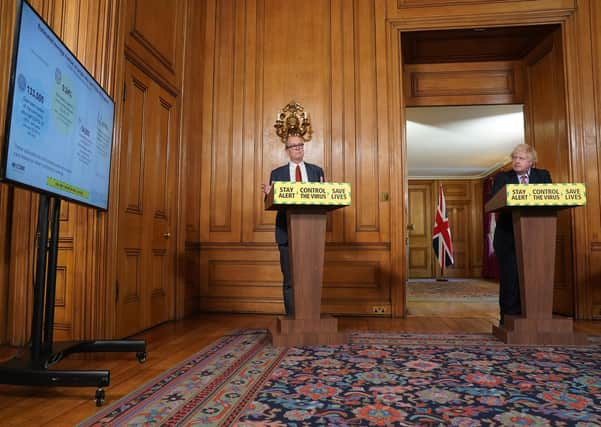After decline, Northern Ireland’s R-number rises – but no alarm yet from politicians


The number indicates how fast coronavirus is transmitting – an R number of one means that every person who gets the virus infects one other person, meaning that only a figure beneath one will mean that the spread of the virus is slowing.
For most of this month, the R-number in Northern Ireland has been around 0.8-0.9 before falling slightly last week.
Advertisement
Hide AdAdvertisement
Hide AdHowever, this morning DUP minister Edwin Poots said that the number had risen and First Minister Arlene Foster said: “It is still below one, but it is not far away from one.”
Nevertheless, politicians today did not sound alarmed about the situation.
Sinn Féin Deputy First Minister Michelle O’Neill said that “we’re making progress on our plan; we’re going in the right direction – so let’s keep going and we’ll get through this together”.
When asked if people should necessarily be alarmed by the increase, or whether it could be explained by an increase in testing or some change in methodology, the government’s chief scientific officer, Patrick Vallance, did not answer clearly.
Advertisement
Hide AdAdvertisement
Hide AdHe told the News Letter that while the R-number remains beneath one everywhere in the UK “there may be areas where it may be very close to one”.
He went on: “That’s why we have to be very cautious. This is not a time to say ‘everything’s OK, we’re releasing measures, everything’s going to be rosy’.
“It’s a time to go very cautiously with changes as they take place, monitored very carefully, being prepared that there will be local outbreaks because there will be and being prepared that therefore recommendations would come to reimpose measures.”
Professor Vallance stressed that “the number of cases remains high; it’s not a low number – so if the R remains at 1, those numbers stay at that high level, whereas what we’ve got to do is get them down”.
He added: “We’re at a fragile state.”
Advertisement
Hide AdAdvertisement
Hide AdWhen Boris Johnson was asked whether he could bring himself to utter any words of criticism for how his chief spad Dominic Cummings had acted – given that lives are at stake if the public health advice becomes bastardised by his spad’s actions – the prime minister declined to say anything critical.
He said: “The crucial message that I want to get to you is that the British people have made heroic sacrifices ... and no, I don’t think that people will respond differently [because of Mr Cummings’ actions]; I think that people will listen very carefully to what the messages are.”
—— ——
A message from the Editor:
Thank you for reading this story on our website. While I have your attention, I also have an important request to make of you.
With the coronavirus lockdown having a major impact on many of our advertisers - and consequently the revenue we receive - we are more reliant than ever on you taking out a digital subscription.
Advertisement
Hide AdAdvertisement
Hide AdSubscribe to newsletter.co.uk and enjoy unlimited access to the best Northern Ireland and UK news and information online and on our app. With a digital subscription, you can read more than 5 articles, see fewer ads, enjoy faster load times, and get access to exclusive newsletters and content. Visit https://www.newsletter.co.uk/subscriptions now to sign up.
Our journalism costs money and we rely on advertising, print and digital revenues to help to support them. By supporting us, we are able to support you in providing trusted, fact-checked content for this website.
Alistair Bushe
Editor